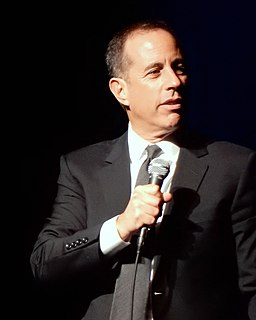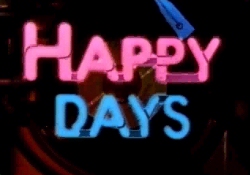Related Research Articles
A rerun or repeat is a rebroadcast of an episode of a radio or television program. There are two types of reruns – those that occur during a hiatus, and those that occur when a program is syndicated.

Seinfeld is an American sitcom television series created by Larry David and Jerry Seinfeld. It aired on NBC from July 5, 1989, to May 14, 1998, over nine seasons and 180 episodes. The show stars Seinfeld as a fictionalized version of himself who is the main protagonist and focuses on his personal life with three of his friends – George Costanza, former girlfriend Elaine Benes, and neighbor across the hall Cosmo Kramer. Seinfeld is set mostly in an apartment building in Manhattan's Upper West Side in New York City. It has been described as "a show about nothing," often focusing on the minutiae of daily life.

Jerome Allen Seinfeld is an American comedian, actor, writer and producer. He is best known for playing a semi-fictionalized version of himself in the sitcom Seinfeld, which he created and wrote with Larry David. The show aired on NBC from 1989 until 1998, becoming one of the most acclaimed and popular American sitcoms of all time. As a stand-up comedian, Seinfeld specializes in observational comedy. In 2004, Comedy Central named him the 12th-greatest stand-up comedian of all time.

Happy Days is an American sitcom television series that aired first-run on the ABC network from January 15, 1974, to September 24, 1984, with a total of 255 half-hour episodes spanning eleven seasons. Created by Garry Marshall, the series was one of the most successful of the 1970s, a sweet vision of life in the mid-1950s to mid-1960s Midwestern United States, and starred Ron Howard as young Richie Cunningham, Henry Winkler as his friend Fonzie, and Tom Bosley and Marion Ross as Richie's parents, Howard and Marion Cunningham. Although it opened to mixed reviews from critics, Happy Days became successful and popular over time.
Broadcast syndication is the practice of leasing the right to broadcasting television shows and radio programs to multiple television stations and radio stations, without going through a broadcast network. It is common in the United States where broadcast programming is scheduled by television networks with local independent affiliates. Syndication is less widespread in the rest of the world, as most countries have centralized networks or television stations without local affiliates. Shows can be syndicated internationally, although this is less common.
A television pilot is a standalone episode of a television series that is used to sell the show to a television network. At the time of its creation, the pilot is meant to be the testing ground to gauge whether a series will be successful. It is, therefore, a test episode for the intended television series, an early step in the series development, much like pilot studies serve as precursors to the start of larger activity.
Television is one of the major mass media of the United States. As of 2011, household ownership of television sets in the country is 96.7%, with approximately 114,200,000 American households owning at least one television set as of August 2013. The majority of households have more than one set. The peak ownership percentage of households with at least one television set occurred during the 1996–97 season, with 98.4% ownership.

Garry Kent Marshall was an American film director, film producer, screenwriter, and actor who is best known for creating Happy Days and its various spin-offs, developing Neil Simon's 1965 play The Odd Couple for television, and directing Pretty Woman, Beaches, Runaway Bride, Valentine's Day, New Year's Eve, Mother's Day, The Princess Diaries, and The Princess Diaries 2: Royal Engagement.

Joanie Loves Chachi is an American sitcom television series and a spin-off of Happy Days that aired on ABC from March 23, 1982 to May 24, 1983. It stars Erin Moran and Scott Baio as the characters Joanie Cunningham and Chachi Arcola, respectively. The series was a ratings flop and was cancelled after only 17 episodes.
"The Seinfeld Chronicles" is the pilot episode of the American sitcom Seinfeld, which first aired on NBC on July 5, 1989.

Albert Francis Molinaro was an American actor. He played Al Delvecchio on Happy Days and Officer Murray Greshler on The Odd Couple. He also appeared in many television commercials, including On-Cor frozen dinners.
Daytime television is the general term for television show produced for airing during the daytime hours on weekdays. The hours and days for daytime television in the United States usually run from 6:00am to 8:00pm ET, Monday through Friday; although it may vary depending on time zone, region, networks and local stations. This article is only about American daytime television that is aired primarily on American network television and their affiliated stations; for information about international daytime television, see Daytime television.

The Abbott and Costello Show is an American television sitcom starring the popular comedy team of Bud Abbott and Lou Costello. The program premiered in syndication in the fall of 1952 and ran two seasons, to the spring of 1954. Each season ran 26 episodes.
"The Deal" is the ninth episode of the second season of NBC's Seinfeld, and the show's 14th episode overall. The episode centers on protagonists Jerry and Elaine Benes who decide to have a sexual relationship, with a set of ground rules. However, as their "relationship" progresses, they experience difficulties maintaining their original friendship.
"The Chinese Restaurant" is the 11th episode of the sitcom Seinfeld's second season on NBC, and is the show's 16th episode overall. The episode revolves around protagonist Jerry and his friends Elaine Benes and George Costanza waiting for a table at a Chinese restaurant, on their way to see a one-night showing of a movie. George tries to use the phone that is constantly occupied and Jerry recognizes a woman, but he is unsure where he has seen her before.
"The Keys" is the 40th episode of the sitcom Seinfeld. It is the 23rd, and final, episode of the third season and the first of a three-episode story arc. It first aired on May 6, 1992. Candice Bergen guest stars as herself, playing the title character from Murphy Brown in a TV episode within a TV episode.
"Male Unbonding" is the fourth episode of the NBC sitcom Seinfeld to be produced, and aired on June 14, 1990, as the fourth episode of the first season.
In broadcast programming, burning off is the airing of otherwise-abandoned television programs, usually by scheduling in far less important time slots, moving shows to lower-rated sister networks, or taking long hiatuses.
Daytime is a block of television show taking place during the late-morning and afternoon on weekdays. Daytime programming is typically broadcast programming to air between the hours of 9 a.m. and 5:00 p.m., following the early morning daypart typically dedicated to morning shows, and preceding the evening dayparts that eventually lead into prime time.

Laff is an American digital multicast television network headquartered in Cincinnati, Ohio is owned by the Katz Broadcasting subsidiary of the E. W. Scripps Company. The network specializes in comedy programming, featuring a mix of feature films and archived sitcoms. Laff is targeted at adults between the ages of 18 and 49 years old.
References
- ↑ Gleiser, Paul. What happened to Paul Harvey at 7:30 each morning?. KTBB news release. Undated. Archived July 13, 2011, at the Wayback Machine
- ↑ Garrison, Bruce (4 April 2014). Professional Feature Writing. Routledge. pp. 13–16. ISBN 9781135676773.
- ↑ Marrs, Megan (2017-12-19). "What is Evergreen Content?". Wordstream. Retrieved 2019-07-05.
- ↑ Craw, Victoria (2017-02-08). "Steve Bannon is still making money from 'Seinfeld' reruns". The New York Post. Retrieved 2017-09-07.
- ↑ Garry Marshall discusses creating Happy Days with EmmyTvLegends.org (posted to YouTube on July 13, 2012)
- ↑ Hochman, David (2006-02-12). "Even Those 70's Kids Should Have Seen It Coming". The New York Times.
Like 'Happy Days', 'That 70's Show' blends smart comedy with light social commentary.
- ↑ Pergament, Alan (January 25, 2018). "English is back with 'Murphy Brown' revival that fits political climate". The Buffalo News. Retrieved January 25, 2018.
The attention to current events – which became old – is one of the reasons that "Murphy Brown" was never as big in syndication as expected.
- ↑ Rice, Lynette (20 June 2018). "Jerry Springer Has Stopped Making His Talk Show". Entertainment Weekly . Retrieved 21 June 2018.
| This journalism-related article is a stub. You can help Wikipedia by expanding it. |